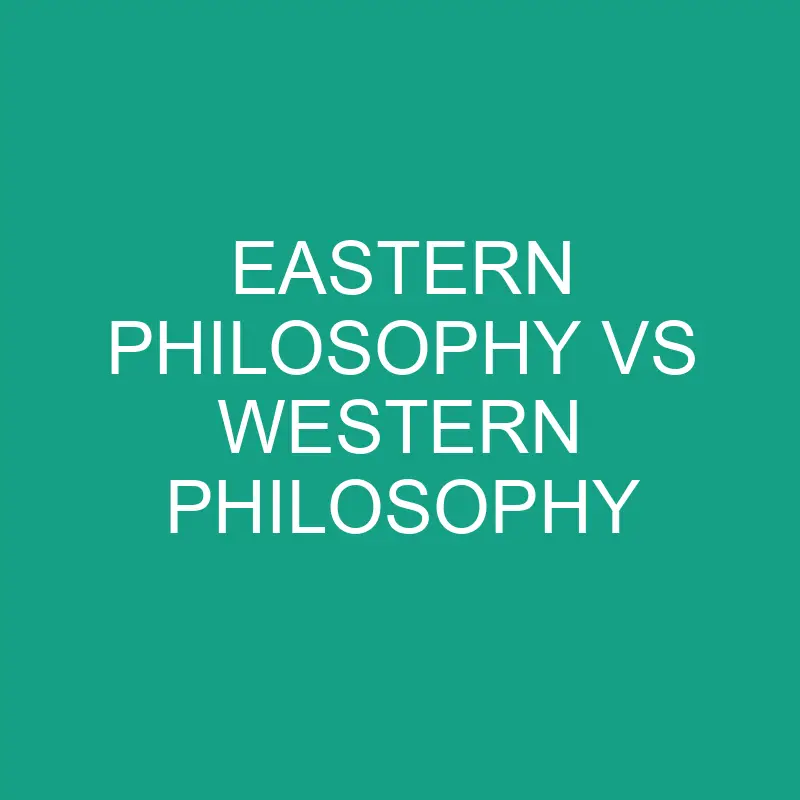Eastern philosophy and Western philosophy are two distinct philosophical traditions that have evolved over thousands of years in different parts of the world. While both traditions share some common philosophical themes and questions, they differ in their approaches, methods, and fundamental beliefs. In this article, we will define each tradition, provide examples, and discuss the pros and cons of each.
Post Contents
Eastern Philosophy:
Eastern philosophy encompasses a diverse range of philosophical traditions that originated in Asia, including Hinduism, Buddhism, Taoism, and Confucianism. Eastern philosophy emphasizes the interconnectedness of all things, the impermanence of existence, and the importance of achieving inner peace and enlightenment.
Example: Buddhism, which originated in India, emphasizes the importance of overcoming suffering through mindfulness, meditation, and self-reflection.
Pros: Eastern philosophy offers a unique perspective on the nature of reality and human existence, emphasizing the importance of compassion, mindfulness, and inner peace. It provides tools for personal growth and self-improvement.
Cons: Eastern philosophy can be difficult for Westerners to understand and apply, as it often challenges many Western assumptions about reality and the nature of the self.
Western Philosophy:
Western philosophy encompasses a diverse range of philosophical traditions that originated in Europe and the Middle East, including Ancient Greek philosophy, medieval philosophy, and modern philosophy. Western philosophy emphasizes reason, logic, and critical thinking, and seeks to understand the nature of reality and the human condition through rational inquiry.
Example: The philosophy of Immanuel Kant, a German philosopher of the Enlightenment era, emphasized the importance of rationality, morality, and individual autonomy.
Pros: Western philosophy provides a rigorous and systematic approach to understanding the world and the human condition, emphasizing the importance of critical thinking, logic, and rational inquiry.
Cons: Western philosophy can be overly focused on abstract and theoretical concepts, and can sometimes neglect the importance of emotions, intuition, and lived experience. It can also be limited by the cultural and historical contexts in which it was developed.
Eastern Philosophy Vs Western Philosophy Similarities and Differences
Similarities:
- Both traditions seek to understand the nature of reality and the human condition.
- Both emphasize the importance of ethics, morality, and personal growth.
- Both offer insights into the nature of consciousness and the relationship between mind and body.
Differences:
- Western philosophy emphasizes reason, logic, and critical thinking, while Eastern philosophy emphasizes intuition, mindfulness, and meditation.
- Western philosophy tends to focus on the individual as a rational agent, while Eastern philosophy emphasizes the interconnectedness of all things and the importance of achieving inner peace and enlightenment.
- Western philosophy has been heavily influenced by Greek and Roman thought, while Eastern philosophy has been shaped by a diverse range of religious and cultural traditions, including Hinduism, Buddhism, Taoism, and Confucianism.
Overall, while there are certainly differences between Western and Eastern philosophy, both traditions offer valuable insights into the nature of reality and the human experience. By engaging with and learning from both traditions, we can deepen our understanding of the world and ourselves, and cultivate a more nuanced and holistic worldview.
Western Philosophy Vs Eastern Philosophy Comparison Table
Sure, here’s a comparison table between Western and Eastern philosophy:
| Western Philosophy | Eastern Philosophy |
|---|---|
| Emphasizes reason, logic, and critical thinking | Emphasizes intuition, mindfulness, and meditation |
| Focuses on the individual as a rational agent | Emphasizes the interconnectedness of all things |
| Has been heavily influenced by Greek and Roman thought | Has been shaped by diverse religious and cultural traditions, including Hinduism, Buddhism, Taoism, and Confucianism |
| Tends to prioritize objective knowledge | Emphasizes subjective experience and spiritual development |
| Values individualism, independence, and personal responsibility | Values community, social harmony, and the interconnectedness of all beings |
| Tends to view reality as material and objective | Tends to view reality as interconnected and subjective |
| Has traditionally been associated with science and the natural sciences | Has traditionally been associated with spirituality and the humanities |
It’s worth noting that these are broad generalizations and that both Western and Eastern philosophy encompass a diverse range of traditions, ideas, and perspectives. Nevertheless, this table provides a useful overview of some of the key similarities and differences between these two philosophical traditions.
Summary:
Eastern philosophy and Western philosophy are two distinct philosophical traditions that offer different approaches and perspectives on the nature of reality and the human condition. Eastern philosophy emphasizes the interconnectedness of all things and the importance of achieving inner peace and enlightenment, while Western philosophy emphasizes reason, logic, and critical thinking in the pursuit of understanding. Each tradition has its own pros and cons, and it is important to understand and respect the philosophical beliefs and values of different cultures and traditions. By engaging with and learning from both traditions, we can expand our horizons and deepen our understanding of the world and ourselves.
